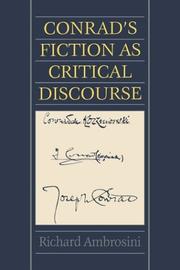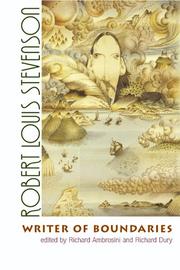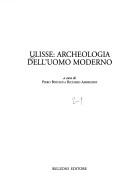| Listing 1 - 5 of 5 |
Sort by
|

ISBN: 0521403499 0521067243 0511983891 9780511983894 9780521403498 9780521067249 Year: 1991 Publisher: Cambridge Cambridge University Press
Abstract | Keywords | Export | Availability | Bookmark
 Loading...
Loading...Choose an application
- Reference Manager
- EndNote
- RefWorks (Direct export to RefWorks)
Joseph Conrad's comments about his works have commonly been dismissed as theoretically unsophisticated, while the critical notions of James, Woolf and Joyce have come to shape our understanding of the modern novel. Richard Ambrosini's study of Conrad's Fiction as Critical Discourse makes an original claim for the importance of his theoretical ideas as they are formed, tested, and eventually redefined in Heart of Darkness and Lord Jim. Setting the narrator's discourse in these tales in the context of the dynamic interplay of Conrad's fictional with his non-fictional writings, and of the transformations in his narrative forms, Ambrosini defines Conrad's view of fiction and the artistic ideal underlying his commitment as a writer in a new and challenging way. Conrad's innovatory techniques as a novelist are shown in the continuity of his theoretical enterprise, from the early search for an artistic prose and a personal novel form, to the later dislocations of perspective achieved by manipulation of conventions drawn from popular fiction. This reassessment of Conrad's critical thought offers a new perspective on the transition from the Victorian novel to contemporary fiction.
Conrad, Joseph --- Arts and Humanities --- Literature --- Didactic fiction, English --- Discourse analysis, Literary. --- History and criticism. --- Conrad, Joseph, --- Criticism and interpretation. --- Aesthetics. --- Literary discourse analysis --- Rhetoric --- Literary style --- Korzeniowski, Józef Konrad Teodor, --- Korzeniowski, Joseph Conrad Theodore, --- Konrad, Dzhozef, --- Kʻang-la-te, --- Conrad-Korzeniowski, Joseph, --- Korzeniowski, Joseph Conrad-, --- Kʻonradŭ, Josep, --- Kʻonradŭ, Chosep, --- Kʻolladŭ, Josep, --- Konrad, Dzd. --- Conrad, Józef, --- קונראד, ג׳וזף, --- קונראד, ג׳וסף --- קונרד, ג׳וזף --- קונרד, ג׳וזף, --- קונרד, יוסף --- 康拉德, --- Konrad Nalecz Korzeniowsky, Jozef Tedor, --- Konrant, Tzozeph,

ISBN: 1282269917 9786612269912 0299212238 9780299212230 0299212203 9780299212209 0299212246 9780299212247 9781282269910 661226991X Year: 2006 Publisher: Madison : University of Wisconsin Press,
Abstract | Keywords | Export | Availability | Bookmark
 Loading...
Loading...Choose an application
- Reference Manager
- EndNote
- RefWorks (Direct export to RefWorks)
Book
ISBN: 1282481428 9786612481420 144381623X 9781443816236 1443814369 9781443814362 9781282481428 6612481420 Year: 2009 Publisher: Newcastle upon Tyne : Cambridge Scholars Pub.,
Abstract | Keywords | Export | Availability | Bookmark
 Loading...
Loading...Choose an application
- Reference Manager
- EndNote
- RefWorks (Direct export to RefWorks)
"Edinburgh, late 1860s. Two young gentlemen, two cousins, their heads buzzing with ideas and artistic ambitions (one dreaming of becoming a painter, the other a writer), hang over North Bridge 'watching the trains start southward and longing to start too', the Walter Scott Monument a short way behind them, but their eyes fixed on the tracks leading South-not just to London, but also, and especially, to Paris." In their Introduction the editors of this volume see this scene with his painter co...
English literature --- Literature, Victorian --- Victorian literature --- Stevenson, Robert Louis, --- Stevenson, R. L. --- Shih-ti-wen-sheng, --- Stivenson, Robert Lui, --- Sŭtʻibŭnsŭn, R. L., --- Sitivensin, Robert Loui, --- Stivenson, Robert Lʹi︠u︡is, --- Stivensoni, Robert Luis, --- Sṭivanasana, Āra. Ela., --- Sṭivansana, Āra. Ela., --- Stivenson, R. L. --- Стивенсон, Роберт Луис, --- Стивенсон. Р. Л., --- סטיבנסון, רוברט לואיס --- סטיבנסון, רוברט לואיס, --- סטיבנסון, רוברט לואס --- סטיבנסון, ר״ל, --- סטיבנסון, ר. ל. --- סטיווענסאן, ראבערט ל. --- סטיװענסאן, ראבערט לואיס, --- 史蒂文森罗伯特·路易斯, --- R.L. スティーブンソン, --- R.L.スティーヴンソン, --- R. L. S. --- RLS --- S., R. L. --- Criticism and interpretation. --- Influence. --- Stevenson, Robert Louis --- Europa.

Abstract | Keywords | Export | Availability | Bookmark
 Loading...
Loading...Choose an application
- Reference Manager
- EndNote
- RefWorks (Direct export to RefWorks)
Book
ISBN: 8809206428 9788809206427 Year: 1995 Publisher: Firenze : Giunti,
Abstract | Keywords | Export | Availability | Bookmark
 Loading...
Loading...Choose an application
- Reference Manager
- EndNote
- RefWorks (Direct export to RefWorks)
Communists --- PCI. --- Populaire cultuur. --- Popular culture --- History
| Listing 1 - 5 of 5 |
Sort by
|

 Search
Search Feedback
Feedback About UniCat
About UniCat  Help
Help News
News